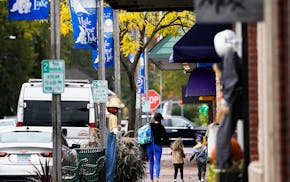From baby formula to laundry detergent to razors, organized crime rings are swiping these household items, reselling them and costing retailers — and consumers — billions. But the St. Paul Police Department is going after the criminals with a newly formed unit focused on catching the crooks and the resellers.
It would be the first organized retail crime unit in Minnesota, police say.
According to the National Retail Federation (NRF), organized retail crime is estimated to cost retailers across the country $30 billion a year. Eight in 10 retailers say that organized retail crime has increased over the last three years, according to the federation's 2013 survey.
Sgt. Charles Anderson, who is heading the department's one-year pilot, and who works in the Western District, first began to see a pattern when he was reviewing shoplifting reports.
"I found that some of the stuff that people were taking just seemed coordinated," Anderson said. "Large volumes of the same types of items, and I didn't really understand it."
The way it works is that relatively expensive items such as laundry detergent and energy drinks are stolen in bulk by "boosters" or professional shoplifters, often chronic offenders, Anderson said.
The products are then sold at "fencing" operations, sometimes online but commonly at local mom-and-pop corner stores. These stores wouldn't normally be able to stock the items especially this inexpensively, Anderson said.
Organized retail crime (ORC) is costly for both retailers and consumers, said Richard Mellor, vice president of loss prevention at NRF. Retailers spend some $12 billion a year combating organized retail theft.
"It results in unavailability [of] the product that the consumer wants," he said. "When the retailer is able to get it again, it may very well be at a price increase."
It can also be a public health risk, when popular items such as baby formula is stolen and resold, Anderson said.
"That really presents a very specific threat to public safety. … If for whatever reason that stuff can get put back on a shelf in an expired way or if it's been stored incorrectly, you are putting, potentially, infants at risk," he said.
Last year, four St. Paul mom-and-pop stores were busted for selling stolen products in what police called "Operation Pacifier." In one case, defendants allegedly bought bottles of Tide detergent for $2 to $4 each and sold them for about $10. At the time, the retail price of a 2.95-liter bottle was around $12.
"I think we're overdue in addressing this specific problem," Anderson said.
Many times the thieves were getting minor punishment for shoplifting, and theft statutes were being underutilized, Anderson said.
"There is no mechanism to differentiate between simple shoplifting, that crime of desperation [for a] person who is stealing food for themselves or for their family and ORC behavior," he said.
But that's all about to change.
With the formation of the unit, Anderson and another officer will handle all of the city's 1,300 shoplifting cases so that they can identify what's just a minor theft and what's an organized enterprise. The unit's goals are to shut down fencing operations and put boosters behind bars.
They will also train officers and work with private businesses and the city attorney's office to fight the crime.
In addition to forming the unit, Anderson also hopes to create an organized retail crime association made up of other law enforcement agencies across the area so that they can share information.
"[ORCAs] have started, and this is a great thing, to pop up all over the country now," Mellor, said.
Nicole Norfleet • 612-673-4495

Shop the curbs for free on 'Trash to Treasure Day' in White Bear Lake

Meet the Athena Award winners: 103 female athletes honored by their schools

Lacrosse lists: 21 top players and the school that's No. 1 for boys and girls

